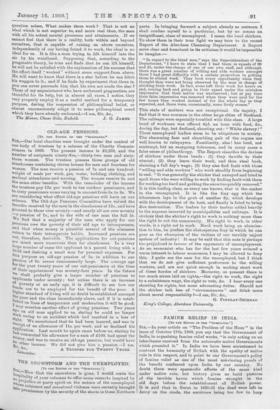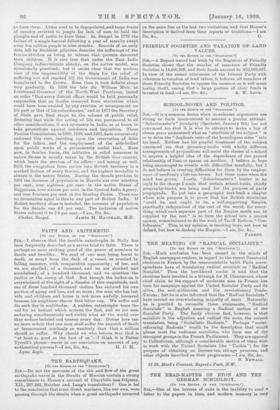FAMINE RELIEF IN INDIA.
[To TIM EDtTOR Or Tax uSPR0TATOF..1 SIR,—In your article on "The Problem of the Hour" in the issue of October 17th, 1908, you say that the Government of India, in organising famine relief works, "is only acting on an inheritance received from the autocratic native Governments which preceded it." In India we have been accustomed to contrast the humanity of British with the apathy of native rule in this respect, and to point to our Government's policy of famine relief as one of the most oonvincing proofs of the benefit conferred upon India by our country. No doubt there were spasmodic efforts of the same kind under native rule, but history gives us lurid pictures of the terrible havoc which famine wrought in the old days before the establishment of British power. It is said that in Surat in 1630-31 the dead were left to decny on the roads, the survivors being too few to bury or burn them. Cities used to be depopulated„and large tracts of country reverted to jungle for lack of men to bold the ploughs and of cattle to draw them. In Bengal in 1770 the failure of a single harvest following a year of scarcity swept away ten million people in nine months. Records of an early date, left by Buddhist pilgrims, describe the sufferings of the famine-stricken as being so intense that parents devoured their children. It is also true that under the East India Company indiscriminate charity, on the native model, was occasionally practised; but it seems clear that the modern view of the responsibility of the State for the relief of suffering was not reached till the Government of India was transferred to the Crown. Even then it took definite shape very gradually. In 1868 the late Sir William Muir, as Lieutenant-Governor of the North-West Provinces, issued an order "that every district officer would be held personally responsible that no deaths occurred from starvation which could have been avoided by any exertion or arrangement on his part or that of his subordinates," and in 1877 the Secretary of State gave final shape to the scheme of public relief, declaring that while the saving of life MIR paramount to all other considerations, it was necessary in India, as at home, to take precautions against indolence and -imposition. Three Famine Commissions, in 1880, 1898, and 1901, have successively endorsed this view, insisting upon the reservation of doles for the infirm and the employment of the able-bodied upon public works of a permanently useful kind. Even now, in famine times, the initiative in relief measures in native States is usually taken by the British Gov,rnment, which lends the services of its officen and money as well. Still, the emigration from native into British territory is a marked feature of every famine, and the highest mortality is always in the native States. During the decade previous to 1901 the decrease of population in Baroda was over nineteen per cent., over eighteen per cent. in the native States of Rajputana, over sixteen per cent, in the Central India Agency, and over fourteen per cent. in the Bombay States. There was no devastation equal to this in any part of British India. If British territory alone is included, the increase of population for the decade was 4.8 per cent. The inclusion of native States reduced it to 2.4 per cent.—I am, Sir, &c.,
Chakai, Bengal. JAMES M. MACPHAIL, M.D.





































 Previous page
Previous page